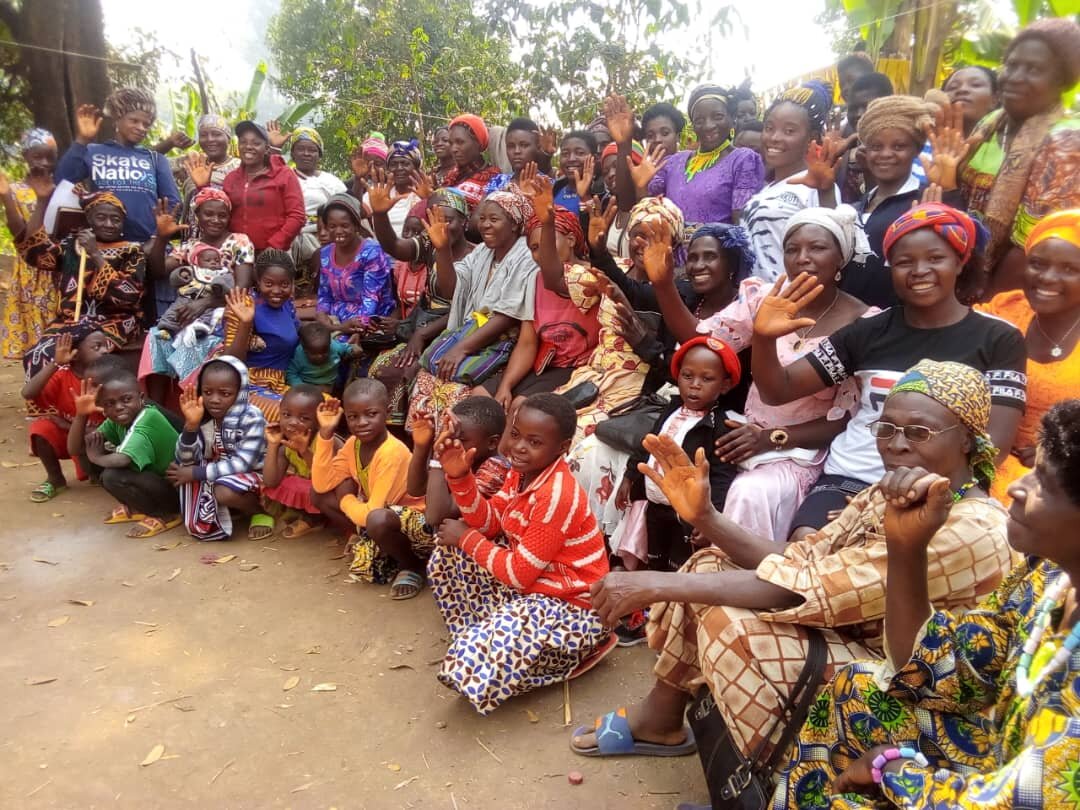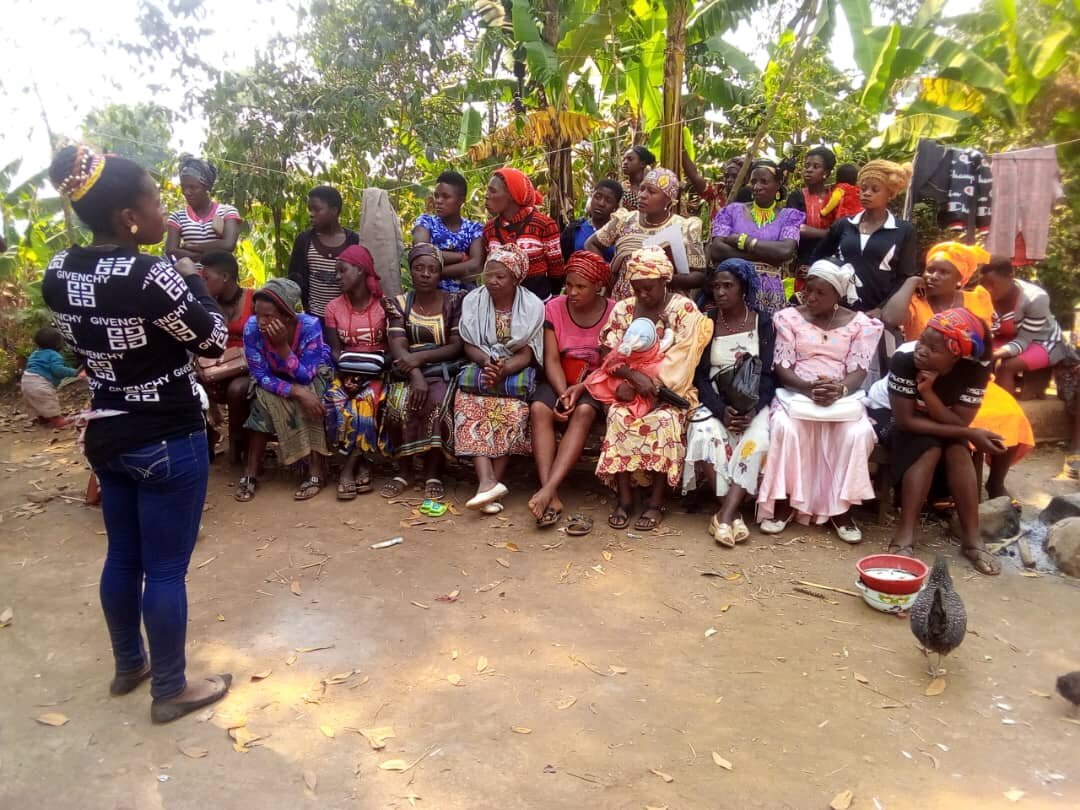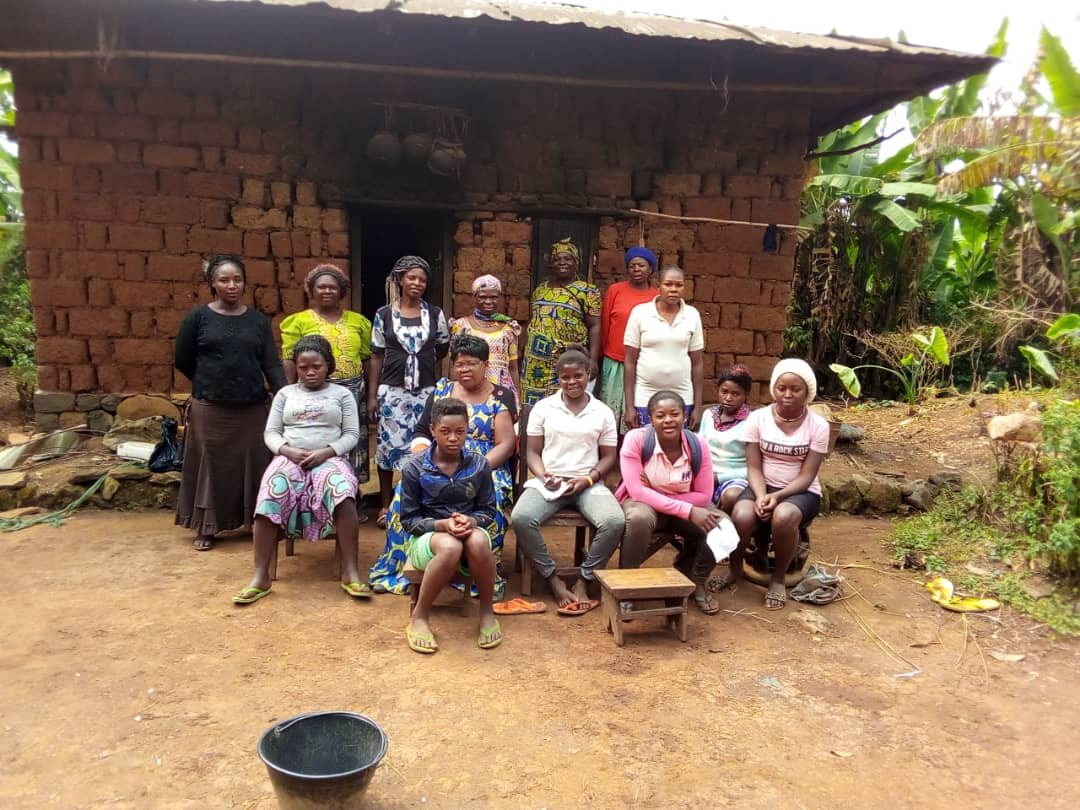Rockflower partner, African Youth Alliance, based in Cameroon, has been working to support seven groups of women in five different villages, utilizing Rockflower’s Five Key Framework. The project includes thoughtful elements that serve to improve the women’s quality of life through training focused on peace and security, maternal and reproductive health, access to food and water, education, and economic empowerment. This two year project has faced a great deal of challenges as a result of the pandemic, however, since resuming activities in March of 2021, the project has had a great impact on the lives of women, and has pivoted to include COVID-19 prevention education into their curriculum. AYA has provided an update on the program and its impact on the community.
Peace and Security:
AYA held a number of group discussions on peace and security to help women to better manage crises and conflict in their own homes and communities. The rate of physical and/or sexual violence toward women from intimate partners in Cameroon is 51%. More than half of the women attending these sessions had themselves been victims of domestic and/or sexual violence. The trainings not only taught them how to react and de-escalate conflict and violence, but how to protect themselves and understand their rights and power in these situations.
At the end of each training session, the women were encouraged to stay in contact with one another and continue to have conversations on these topics. The group labeled themselves as ‘Community Peace Ambassadors’ and as such committed to sharing knowledge regularly, providing training to others, informing their community that they can be contacted in times of crisis, as well as working together to identify problems and seek solutions for women’s safety.
Group participant, Petra Mbom, a 25 year old, single and a mother told AYA, “I have benefitted as well as my group because we have been taught that women also have rights and that they can stand firm to defend themselves. Also from the lectures given we are able to settle disputes in our families and in our community and we hope to change certain aspects in our community. That is, allowing women to have rights to landed property is our target.”
Maternal and Reproductive Health:
AYA knew that focusing on women’s reproductive and sexual health was one of the most important aspects of this project. Since the women in these groups have received little, if any education on their sexual health, the potential for impact was immense.
The primary focus areas for these sessions were education on HIV/AIDS, family planning, and menstruation. AYA enlisted the help of community nurses to stress the importance of learning their HIV/AIDS status, help them to understand the damage caused by stigamitizing and discriminating against other women based on their status, and to educate women who are HIV positive on how to stop the spread.
In terms of family planning, the group focused on practices that would promote the health of both the mother and child, such as spacing out births. This topic was particularly impactful, as some of the women came to the session with the belief that they were going to be discouraged from having children, which was not the case.
One participant explained, “Family planning has been taught in our group and we now understand that family planning does not mean women should stop giving birth or should not give birth, but it helps women to space their births and maintain a healthy family. Also, we now know the importance of reusable sanitary pads, how to use and take proper care of the pads.” Overall, the participants learned a great deal about caring for themselves as they navigate childbirth, sexually transmitted illnesses, and menstruation.
Access to Food and Water:
This portion of the project focused primarily on agriculture and land stewardship. Many of the women who participated in this training were already farmers by trade, while others were interested in gardening to supplement their family’s food supply. Some of the skills taught included preparing land for farming or gardening, propagating and nursing fruit trees, and understanding root systems.
The women also gained knowledge on land stewardship and conservation. They began a project in which they mapped out sites that would be considered unsafe or risky for farming, which led to a much higher success rate of crops in the area. This was the first time that the community conducted a study of land types, and it will have great long-term benefits. Through this mapping the women learned about the impacts of deforestation, land erosion and overfarming. They also learned about and implemented compost piles, harvested cabbage from community gardens and began an initiative titled “Operation One Man One Tree” in which each participant will plant a tree and encourage friends and family to do the same.
One participant, Ngwainmbi Mercy, who is 26 years old, married and a mother of two children said she has benefitted from the agricultural techniques that she learned through AYA’s training. Her and her group have been able to cultivate carrots, cabbages, and beans and this has helped them to provide food for their families and communities.
Education:
Due to the immense success and positive feedback from the maternal and reproductive health education, AYA decided to focus their education training on female empowerment. Several group meetings were held in which the groups discussed the negative impacts of early marriage and teenage pregnancy. They also gained valuable insight about the role of sexuality for women, which is generally considered taboo to discuss. Much of the conversation focused on the importance of fighting for their rights, maintaining good self esteem, and discrediting many cultural norms and traditions that serve to keep women out of positions of power.
After this training, the women felt that they had a better understanding of how to live their lives with dignity, without shame and how to encourage the next generation of women to lead fulfilling lives.
Juscentha Fukuin, a 40 year old mother of four children told AYA that she will no longer encourage her children to marry at a young age.
Another participant, fourteen year old Belva Ndum said “I have benefitted from the lectures on general hygiene, and I can now take good care of myself. I have hope in the future despite the crisis and the closure of schools. I also know I have to work hard if I want to be a good leader in future.”
The sessions typically ended with goal setting, where the women were able to discuss what they hoped to achieve, and how they could support one another to achieve those goals.
Economic Empowerment:
The final pillar of AYA’s training focused on ensuring that the participants had an understanding of how to manage a small business. In these training sessions, they learned basic accounting principles, book keeping, how to evaluate business growth, identifying financial setbacks, and strategies to overcome setbacks.
AYA also created a revolving loan scheme, in which each of the women would contribute a certain amount of their income to provide loans to others. As their businesses grow, so would the fund, and more businesses could emerge. This year, the women were able to fund half of their goal for the revolving loan scheme. As their businesses gradually grew throughout the year, the group was able to achieve a 44.6% profit from the sales of items like manure, salt, soap, and body lotions. This also served as a hands on lesson in deducting expenses in order to calculate profit.
One business owner, Carine Bih, benefited greatly from this education. She learned that a business and the business owner are separate entities, and that it’s possible for the business owner to owe money to the business. She had been operating a doughnut stand for years, and had seen almost no profit. She told AYA that she would often give donuts away to her friends and family, but she wasn’t clear on the fact that when she did that, she would have to owe the cost of those ingredients to the business. Through the group training, she came to understand that she was the reason that her business was not profitable, and she learned how to keep record of any product that she gives away so that she can pay it back to the business.
Many of the women involved in the program had been running businesses for years with no education on how to maintain and account for their business. This education has been invaluable to them as they now are able to recognize their profits and plan for their futures.
Overall, the training and resources provided by AYA has had an immense impact on improving the participants’ knowledge of their rights, especially sexual and reproductive rights, food security, income and agricultural skills. For these rural women in Cameroon, many of whom are young and/or single mothers, this education will serve to allow them to improve their quality of life and that of their families as they plan for the future. AYA noted that due to the challenges faced by these women, including extreme poverty, domestic violence, and child marriages, the program has been met with more than enthusiasm. The women are delighted and eager to better their lives and work together to improve their communities.









